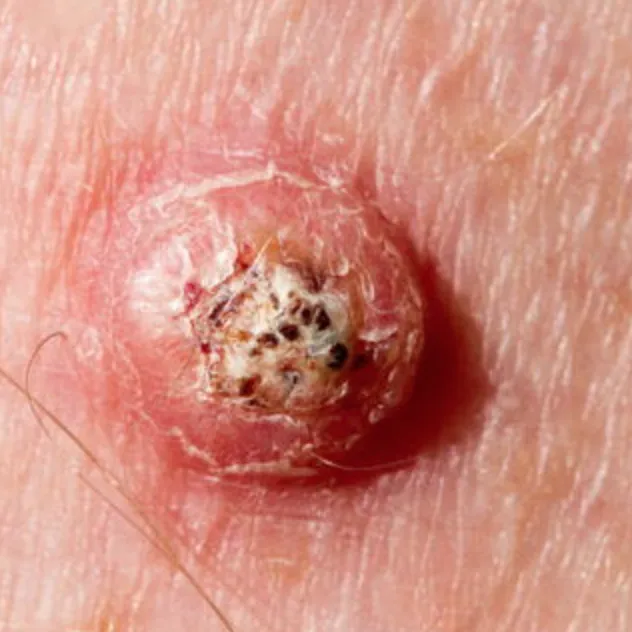St. Pete Location
Bradenton Location
Patient Education
We're passionate about helping people achieve their healthiest, happiest skin. Whether you're struggling with acne, eczema, rosacea, or any other skin concern, we're here to offer support, information, and inspiration.

Beyond Sunburns: The Facts About Squamous Cell Carcinoma| Leah Michel, APRN, FNP-BC
Know Your Skin: Recognizing the Signs of Squamous Cell Carcinoma
Squamous cell carcinoma (SCC) is a type of skin cancer that arises from the squamous cells, which are thin, flat cells that form the outer layer of the skin. It commonly occurs in areas exposed to the sun, such as the face, ears, neck, hands, and arms.

What is Squamous Cell Carcinoma?
Squamous cell carcinoma (SCC) ranks as the second most common type of skin cancer, typically developing in areas exposed to direct sunlight. Predominantly found on the face, nose, ears, lips, neck, and back of the hands, SCC manifests as rough, scaly red patches, wart-like growths, or crusted lesions. These cancers can emerge from precancerous lesions known as actinic keratoses or areas of chronic inflammation.
Symptoms of Squamous Cell Carcinoma
Squamous cell carcinoma can manifest through a variety of skin changes. Persistent, scaly red patches or lesions might appear, often accompanied by raised, rough-surfaced growths or lumps. These growths can develop into open sores that bleed or crust, resembling warts in some cases. Additionally, itching or tenderness in the affected area can be a telltale sign. If you experience any of these symptoms, it's crucial to consult a doctor for prompt evaluation and diagnosis. Early detection is key to successful treatment.
Causes of Squamous Cell Carcinoma
The main cause of squamous cell carcinoma is exposure to excessive ultraviolet (UV) radiation, which can come from artificial sources like tanning beds or the sun's damaging rays. Those with fair skin, a history of blistering sunburns, and advanced age are at an even higher risk. This skin cancer can also form as a result of past radiation therapy, exposure to certain chemicals, or a compromised immune system brought on by disease or medicine. Through comprehension of these risk factors, people can proactively safeguard themselves from this potentially dangerous illness.

Addressing Squamous Cell Carcinoma
While curable when detected early, untreated SCC can have severe consequences. Treatment for squamous cell carcinoma typically involves removing the cancerous growth and may include surgical procedures like electrodesiccation and curettage, excision, and Mohs surgery, with additional alternatives like cryotherapy, topical medications, photodynamic therapy, or radiation in certain cases.
Act Now! Prioritize Your Skin Health with SCC Consultation in St. Pete Bradenton
Concerned about squamous cell carcinoma? Don't delay seeking professional help in St. Pete or Bradenton, and schedule a consultation for expert evaluation and personalized treatment options. Contact us now to prioritize your skin health and well-being.
Disclaimer:
The information on this website is provided for educational and information purposes only and is not medical advice. Always consult with a licensed medical provider and follow their recommendations regardless of what you read on this website. If you think you are having a medical emergency, dial 911 or go to the nearest emergency room. Links to other third-party websites are provided for your convenience only. If you decide to access any of the third-party websites, you do so entirely at your own risk and subject to the terms of use for those websites. Neither My Skin by Leah Michel, APRN, FNP-BC, nor any contributor to this website, makes any representation, express or implied, regarding the information provided on this website or any information you may access on a third-party website using a link. Use of this website does not establish a doctor-patient relationship. If you would like to request an appointment with a health care provider, please call our office at (727) 295-7223.
If you have any questions or concerns about your skin & would like to schedule an appointment at our St. Pete dermatology office or Brandenton dermatology office, please call us today!
St. Pete Location
111 2nd Ave NE., Suite 1406
St Petersburg, FL 33701
Plaza Tower- Downtown St Pete
Phone: (727) 295-7223
Bradenton Location
4301 32nd St. W., Suite D2
Bradenton, FL 34277
Phone: (941) 330-5805







